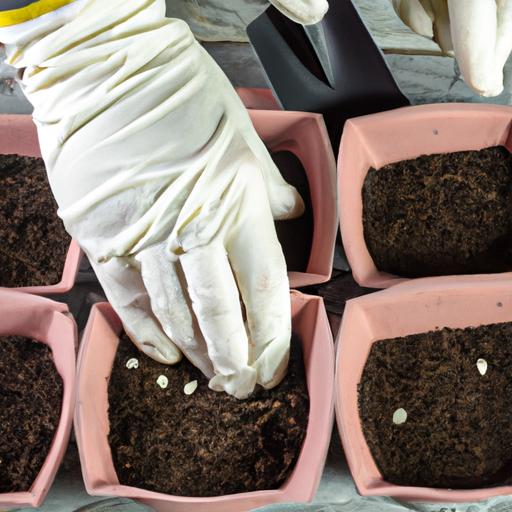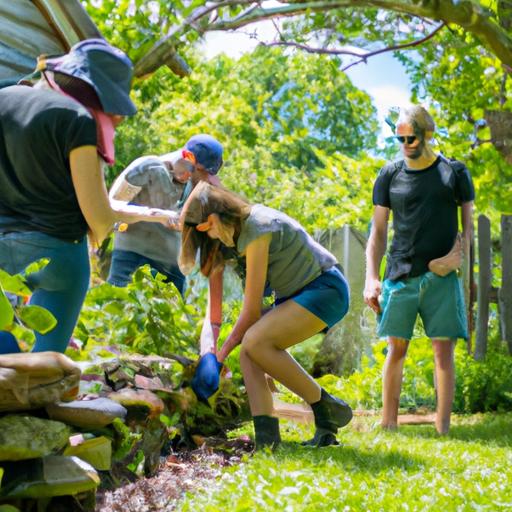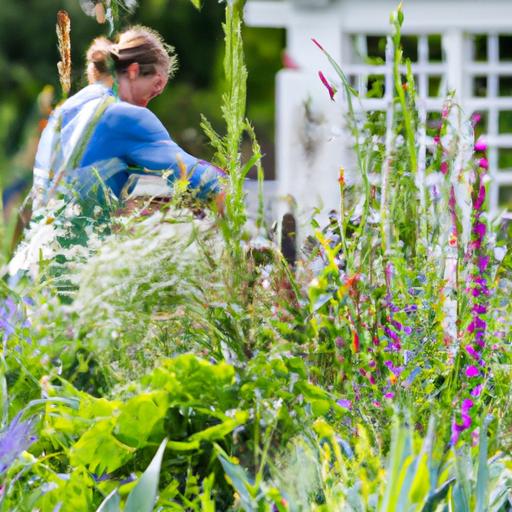Why Gardening is Good for You

Gardening is more than just a hobby; it is a therapeutic journey that nurtures both our physical and mental well-being. In today’s fast-paced world, where stress and anxiety have become commonplace, spending time in nature and tending to plants can offer respite and rejuvenation. Join me as we delve into the myriad of benefits that gardening brings to our lives.
Gardening holds immense importance when it comes to our overall well-being. Whether you have a sprawling backyard or a simple windowsill garden, the act of cultivating plants has a profound impact on our bodies and minds. This article aims to shed light on the wonders that gardening can work in our lives and inspire you to embrace this fulfilling activity.
In this journey, we will explore the physical and mental health benefits of gardening. Engaging in gardening activities not only gets our bodies moving but also aids in calorie burning, weight management, and muscle strengthening. The exposure to sunlight during gardening sessions promotes the production of Vitamin D, crucial for enhancing our bone health and boosting the immune system.
Moreover, gardening is a powerful tool for enhancing our mental well-being. The connection with nature and green spaces has a calming effect on our minds, reducing stress and anxiety levels. It provides an opportunity for relaxation and mindfulness, allowing us to find solace amidst the chaos of daily life. Additionally, gardening stimulates our cognitive function and memory through problem-solving tasks, improving our focus and attention span.
But gardening goes beyond mere physical and mental benefits; it has the potential to be a therapeutic activity. Horticultural therapy has gained recognition for its ability to aid in rehabilitation and recovery, as well as support mental health treatment. Nurturing plants and witnessing their growth instills a sense of purpose and accomplishment, creating a tangible connection to the world around us.
Gardening is not just an individualistic pursuit; it has social benefits as well. It encourages social interaction and community engagement, particularly when participating in community gardens and events. Sharing knowledge and experiences with fellow gardeners fosters a sense of camaraderie and belonging, strengthening relationships and building a supportive community.
In conclusion, gardening offers a holistic approach to well-being, benefiting us physically, mentally, and socially. It is a journey that reconnects us with nature, providing solace and tranquility in a chaotic world. So, why not embark on this enriching adventure and let gardening work its wonders on you? Stay tuned as we explore the physical health benefits of gardening in the next section.
Physical Health Benefits of Gardening
A. Engages in Physical Activity
When we engage in gardening, we embark on a journey that involves physical activity, allowing us to break free from our sedentary lifestyles. Tending to plants, digging, weeding, and watering not only gets our bodies moving but also contributes to our overall fitness.
1. Calorie Burning and Weight Management
Gardening can be a surprisingly effective way to burn calories and manage weight. Activities such as digging and raking can burn up to 300 calories per hour, equivalent to a moderate-intensity workout. By incorporating gardening into our routine, we can take positive strides towards achieving our fitness goals.
2. Strengthening Muscles and Improving Flexibility
The various movements involved in gardening, such as lifting pots, pulling weeds, and bending down to plant, work our muscles and improve flexibility. These repetitive motions help strengthen our arms, legs, and core, enhancing our overall physical strength and agility.
B. Exposure to Sunlight and Vitamin D Production
One of the often-overlooked benefits of gardening is the exposure to sunlight, which contributes to the production of Vitamin D in our bodies.
1. Enhancing Bone Health
Sunlight is a natural source of Vitamin D, necessary for the absorption of calcium and phosphorus in our bodies, thereby promoting healthy bone development and preventing conditions like osteoporosis. Spending time in the garden allows us to soak up the sun’s rays and reap the benefits of this vital nutrient.
2. Boosting the Immune System
Vitamin D also plays a crucial role in strengthening our immune system. Research suggests that adequate levels of Vitamin D can help reduce the risk of respiratory infections, cardiovascular diseases, and certain types of cancer. Gardening provides us with an opportunity to absorb this essential vitamin, boosting our overall immune health.
In the next section, we will explore the mental health benefits of gardening, delving into the positive impact it has on reducing stress and promoting relaxation. So, let’s continue this journey and uncover the wonders that gardening holds for our minds.
Mental Health Benefits of Gardening
A. Reducing Stress and Anxiety Levels
In today’s fast-paced world, stress and anxiety have become ever-present companions. However, the simple act of gardening can provide a much-needed respite from the chaos. Connecting with nature and immersing ourselves in green spaces has a profound impact on our mental well-being.
1. Connection with Nature and Green Spaces
Gardening allows us to escape the concrete jungles and embrace the serenity of nature. The sights, sounds, and scents of the garden offer a sensory experience that calms our minds and rejuvenates our spirits. Whether it’s the vibrant colors of blooming flowers or the gentle rustling of leaves, being in nature has a soothing effect, reducing stress and anxiety levels.
2. Promotion of Relaxation and Mindfulness
When we engage in gardening, we enter a state of mindfulness, focusing our attention on the present moment. The rhythmic actions of planting, watering, and tending to plants become a form of meditation. As we immerse ourselves in these tasks, our minds quieten, and our worries fade away. Gardening promotes relaxation and helps us cultivate a sense of peace and tranquility.
B. Improving Cognitive Function and Memory
Gardening is not only beneficial for our mental well-being but also enhances our cognitive function and memory. The various tasks involved in gardening provide mental stimulation, challenging our brains in unique ways.
1. Mental Stimulation through Problem-Solving Tasks
Gardening requires problem-solving skills as we navigate challenges like pest control, soil management, and plant selection. These tasks engage our minds, stimulating critical thinking and problem-solving abilities. By actively problem-solving in the garden, we exercise our brains and keep them sharp.
2. Enhancing Focus and Attention Span
In a world filled with distractions, gardening offers a reprieve and an opportunity to practice focus and concentration. Whether it’s carefully pruning a plant or meticulously arranging a flower bed, gardening demands our undivided attention. Through these activities, we train ourselves to stay present and improve our focus and attention span, skills that can translate into other areas of our lives.
In conclusion, gardening provides a sanctuary for our minds, reducing stress and anxiety while improving cognitive function and memory. The connection with nature and the practice of mindfulness in the garden contribute to our overall mental well-being. Join me in the next section as we delve into the therapeutic benefits of gardening.
Gardening as a Therapeutic Activity
Gardening goes beyond being a simple pastime; it has the power to heal and restore. The practice of gardening has been recognized as a form of therapy, known as horticultural therapy, which offers a multitude of benefits for our physical and mental well-being.
A. Horticultural therapy and its benefits
Horticultural therapy utilizes gardening activities to assist in rehabilitation and recovery. Whether it is physical rehabilitation after an injury or illness, or emotional healing from trauma, gardening provides a nurturing environment for growth and healing. The act of tending to plants and engaging with nature can have profound effects on our recovery journey.
Moreover, gardening plays a vital role in supporting mental health treatment. It is a therapeutic outlet that allows individuals to express themselves, find solace, and cope with various mental health conditions. The process of gardening can be meditative, helping to alleviate symptoms of anxiety, depression, and stress. It provides a safe space for self-reflection and emotional release.
B. Creating a sense of purpose and accomplishment
One of the most fulfilling aspects of gardening is the sense of purpose and accomplishment it brings. Nurturing plants and witnessing their growth is a testament to our ability to care and nurture. As we sow seeds, tend to the soil, and watch our plants flourish, we develop a deep connection with nature and a profound appreciation for life’s processes.
Furthermore, gardening instills a sense of responsibility and achievement. Taking care of plants requires commitment and dedication. It teaches us the importance of consistency and perseverance. As we witness the fruits of our labor, whether it’s a blooming flower or a bountiful harvest, a sense of pride and accomplishment fills our hearts.
In conclusion, gardening serves as a therapeutic activity that aids in rehabilitation, supports mental health treatment, and fosters a sense of purpose and accomplishment. It provides a sanctuary for healing and growth, allowing us to connect with nature and ourselves on a profound level. Join me in the next section as we explore the social benefits of gardening and its power to foster connections.
Social Benefits of Gardening
A. Encouraging Social Interaction and Community Engagement
Gardening is not merely a solitary activity; it has the power to bring people together and foster a sense of community. By participating in community gardens and events, individuals have the opportunity to connect with like-minded individuals who share their passion for plants and nature. These shared spaces create a platform for social interaction and engagement, where gardeners can exchange ideas, tips, and stories, forming meaningful connections.
- Participating in Community Gardens and Events
Community gardens serve as hubs of social interaction, where individuals from different backgrounds come together to cultivate a shared space. These gardens offer a chance to meet new people, work collaboratively on projects, and learn from one another’s experiences. Whether it’s tending to a communal plot or participating in gardening workshops and events, community gardens provide a sense of belonging and purpose.
- Sharing Knowledge and Experiences with Fellow Gardeners
Gardening communities are filled with a wealth of knowledge and expertise. Engaging with fellow gardeners allows for the exchange of tips, tricks, and gardening techniques that can enhance one’s own gardening journey. The act of sharing experiences and learning from others not only expands our knowledge but also strengthens the bonds within the gardening community.
B. Strengthening Relationships and Fostering Connections
Gardening offers a unique opportunity to bond with family and friends, strengthening relationships and creating lasting memories. Working alongside loved ones in the garden not only deepens the connection but also provides a shared sense of accomplishment and purpose.
- Bonding with Family and Friends through Gardening Activities
Gardening activities provide a wonderful setting for quality time with family and friends. Whether it’s planting seeds, weeding, or harvesting together, these shared experiences create bonds and build cherished memories. Gardening can become a cherished family tradition or a regular activity that friends engage in, fostering a sense of togetherness and creating a strong support system.
- Building a Sense of Belonging and Camaraderie
Being part of a gardening community goes beyond the act of gardening itself. It creates a sense of belonging and camaraderie among individuals with shared interests and passions. The shared love for plants and nature forms the foundation for lasting friendships and a support network that extends beyond the garden. Gardening communities often organize social gatherings, where members can connect and strengthen their relationships, further enhancing the sense of belonging.
In the next section, we will explore the conclusion of why gardening is good for you and summarize the benefits discussed throughout this article.
Conclusion
In conclusion, it is evident that gardening holds numerous benefits for our physical and mental well-being. As we have explored throughout this article, engaging in gardening activities provides a wide array of advantages that go beyond mere aesthetics.
From a physical standpoint, gardening allows us to engage in physical activity, helping us burn calories, manage our weight, and improve our muscle strength and flexibility. The exposure to sunlight during gardening sessions also contributes to the production of Vitamin D, which is essential for our bone health and immune system.
On the mental health front, gardening has proven to be a powerful stress-reliever, reducing anxiety levels and promoting relaxation. The connection with nature and green spaces offers a sense of calm and serenity, while the cognitive stimulation involved in gardening tasks enhances our focus, attention span, and memory.
Moreover, gardening has therapeutic qualities that can aid in rehabilitation and recovery, making it a valuable tool in horticultural therapy. The act of nurturing plants and witnessing their growth instills a sense of purpose and accomplishment, contributing to our overall well-being.
Beyond the personal benefits, gardening also fosters social interaction and community engagement. Participating in community gardens and events allows us to connect with like-minded individuals, share knowledge and experiences, and build a sense of belonging and camaraderie.
In a world that often feels overwhelming, gardening offers us a pathway to reconnect with nature, find solace, and nurture our physical and mental well-being. So, why not grab a shovel, dig deep, and discover the wonders that gardening can bring to your life? Embrace this fulfilling activity, and let it transform you into a happier, healthier version of yourself.
Remember, gardening is more than just planting flowers or growing vegetables; it is a journey of self-discovery, growth, and connection with the natural world. So, go ahead and immerse yourself in the therapeutic embrace of gardening. Your body, mind, and soul will thank you for it.
Conclusion: So above is the Why Gardening is Good for You article. Hopefully with this article you can help you in life, always follow and read our good articles on the website: plants.123didulich.com




